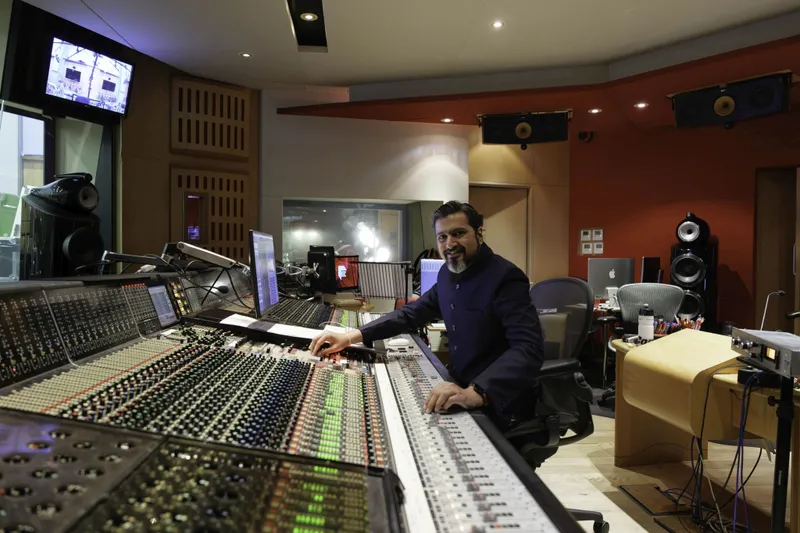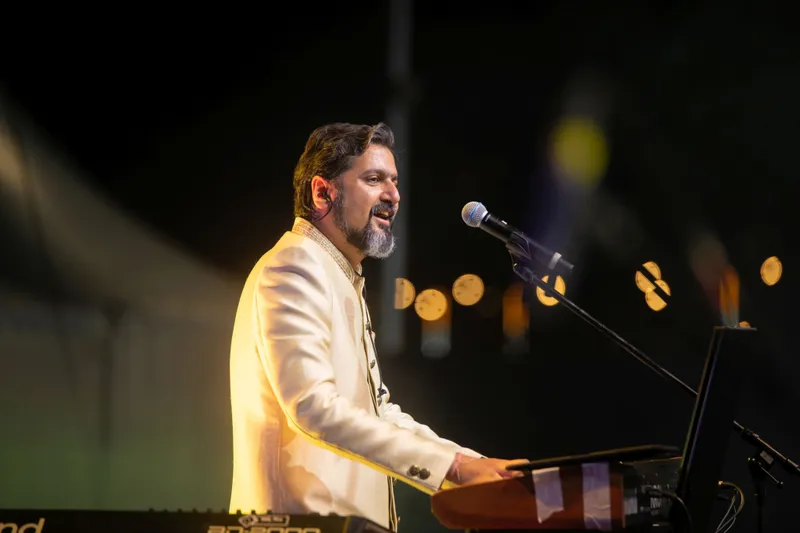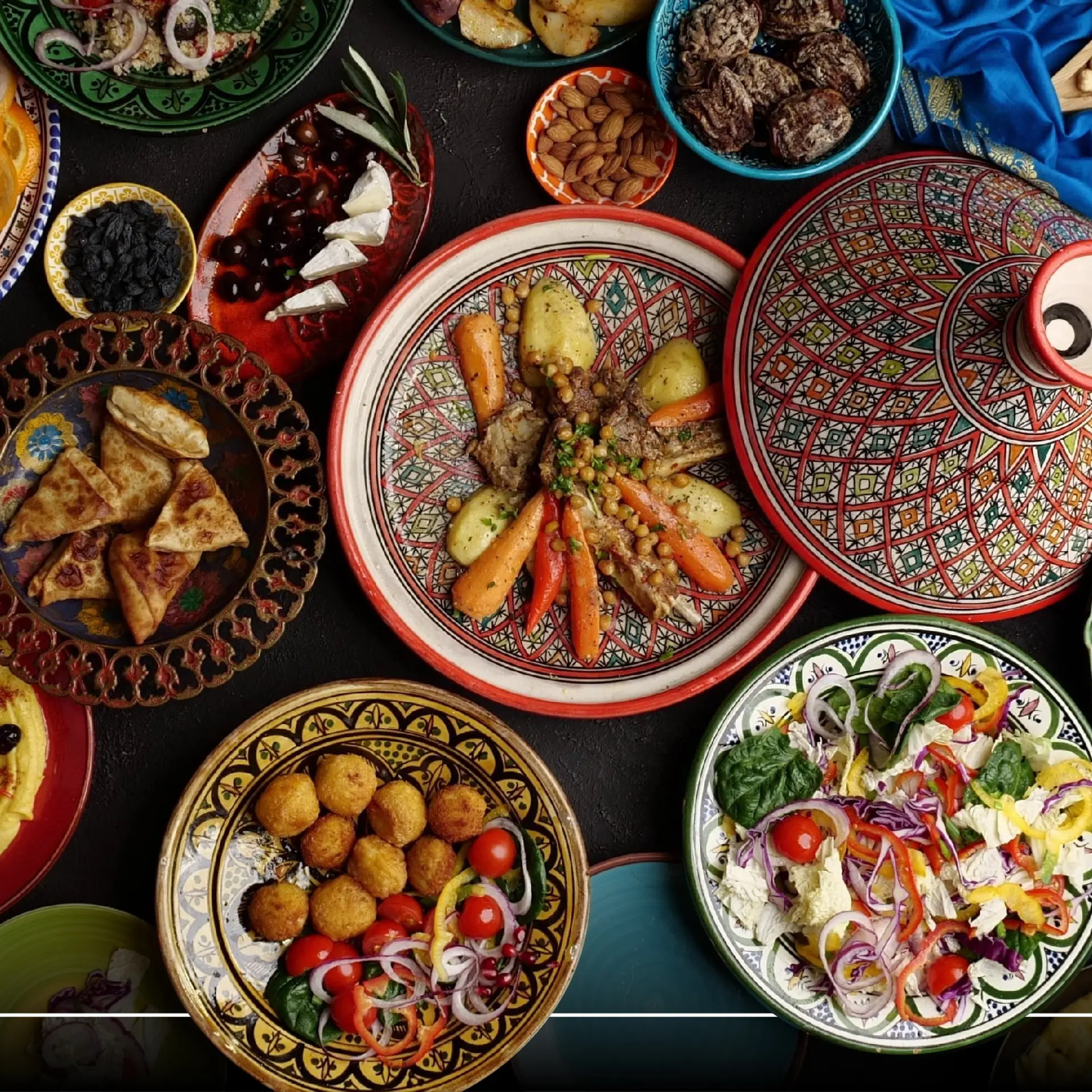The first song I ever played was the Indian national anthem: Grammy winner Ricky Kej
Bengaluru-based music composer and environmentalist Ricky Kej talks at length about his creative tryst with the national anthem, his musical journey, and the role of technology in music today. He believes that, in the age of AI, “boring and generic” composers will become obsolete.
What does one ask a not one- but three-time Grammy winner that no other journalist has asked in an interview? We all know the story of Ricky Kej, the Indian music composer, environmentalist, and the United Nations Goodwill Ambassador.
Born in America, growing up amidst nature and around a lot of musical instruments lying idle, Kej took turns picking up the piano, guitar and keyboard to compose music about the wild animals that sneaked up in his backyard—snakes, lizards, chameleons, frogs, and rodents.
“I was an environmentalist before I knew the meaning of the word. I preferred hanging around with animals more than other humans. My first song, in fact, was about a snake that frequented our house to drink water from the swimming pool in our backyard,” shares Kej over a video call, logging in from his writing room at his home in Bengaluru.
“I have got two studios at home. One’s like a proper studio where I call my clients. This is my private room where I sit down and compose my music, and my good friends are invited here.”
So does this mean I am now friends with a three-time Grammy winner? I resist asking.

Ricky Kej conducting and recording the Royal Philharmonic Orchestra at Abby Road Studios, London
Of course, the artist has a lot of renowned friends with whom he collaborates to make great music.
Kej, along with prominent musicians Pandit Hariprasad Chaurasia, Rakesh Chaurasia, Rahul Sharma, Sheik Mahaboob Subhani, Kaleeshabi Mehaboob, Jayanthi Kumaresh, Giridhar Udupa, Amaan Ali Bangash and Ayaan Ali Bangash, has just launched a new rendition of the Indian National Anthem. The endeavour has also set a Guinness World Record for being the largest-ever orchestra to perform the Indian National Anthem–a 14,000-member choir featuring children from tribal communities.
Incidentally, the first piece of music Kej actually played was the Indian national anthem.
As we speak, his fluffy golden retriever walks into the room and plonks himself right there for a quick nap, without interrupting the conversation.
In a free-wheeling chat, Kej talks about his accomplishments, his creative process, and, of course, the elephant in the room—artificial intelligence and the dread around AI replacing people in creative fields.
Edited excerpts from the conversation …
YS Life [YSL]: A three-time Grammy winner, a US Billboard #1 artist, UN Goodwill Ambassador, and an entrepreneur. Does it not get too overwhelming?
Ricky Kej [RK]: No. Everything is part of one whole—music. Music branches off into all these other aspects of my life.
YSL: Which role do you enjoy the most?
RK: I am a musician at the end of the day. Whatever social impact work I do, everything resonates from music. Even in entrepreneurship, I wanted to create headphones to create a better experience for my listeners. So, I am a musician, and pretty much everything that I do has music as its purpose. Music defines me.
YSL: How did music happen?
RK: I don’t remember a time in my life when I was not playing a musical instrument. Although my father never played any, he had a lot of musical instruments lying around in the house … Maybe in the hope of playing them some day. I remember playing with these instruments since a very young age.
He also had a massive music collection. Not just the hits of his era—Michael Jackson and Madonna—but a whole lot of seemingly obscure music from different parts of the world—folk music from Africa, Europe, Korea, Japan, and a lot from India.
YSL: What made you compose music about the environment?
RK: Most people, when they pick up a musical instrument, end up playing a familiar song. The first song that I ever played was to express myself. I have always wanted every single piece of music that I would play to be a new piece that I’ve actually created. I am not saying it would be any good or nice; nevertheless, irrespective of how horrible it was, it was always an original creation.
Since I felt so strongly about the environment, it became natural for me to express myself through music about the environment.

Ricky Kej during one of his concerts
YSL: What was the first song you created?
RK: Contrary to what I just said, the first piece of music I actually played was the Indian national anthem. But the first original song that I ever wrote was about the snake!
YSL: You collaborated with Bengaluru Airport to create an anthem for its T2 terminal. Can you tell us about it?
RK: It did not start off as a collaboration. I travel a lot, and I am in the airport at least three or four times a week. I spend a lot of time sitting at the airport. I end up opening my laptop and headphones and almost creating a mini-studio in the lounge.
In 2022, during one of those times at the airport, I created music that was inspired by the airport itself. It was a short 30-40 seconds piece, and I sent it across to Hari (Marar, CEO and MD, Bangalore International Airport), who happens to be a good friend.
In the past too, Hari and I have had discussions about how the airport has sustainability and positive social impact at its core. A couple of months later, Hari was launching the T2 terminal and suggested we play this particular piece during the launch.
But it was still incomplete at that point of time. I took about one-and-a-half years to finish it. Once I showed it to the team, they really liked it. That’s where the collaboration started. The team made a video for it showcasing what an airport is all about—meeting people after a long time and beautiful separations.
YSL: You also turned an entrepreneur when you co-founded ‘Kej by Kej’.
RK: Kej By Kej is founded by Vaibhav Mahajan, my classmate from Bishop Cotton Boy’s School (in Bengaluru). He reached out to me with the idea of launching a sound brand together. We would launch headphones first and then move on to bluetooth speakers, and the likes of it.
The headphone idea got me interested since, despite having a huge collection, I didn’t have one headphone that I could use all the time—some would not be strong enough for a particular frequency, some would not be comfortable enough, some would not represent the music well, and sometimes the noise cancellation would destroy the timbre of the music. After all the complaining, here was a challenge for me. So I ended up designing the headphone—the look and sound of it. Once we got it right, we launched it in the market.
YSL: Do you have a process for creating music?
RK: There is no specific structure but I can tell you an average way of how I create music.
It starts with an idea that inspires me. I don’t create music if I am not inspired.
Everything is usually created on a computer; I use a lot of technology. All the ideas are sketched on a computer, all the instruments—violins, drums and guitars—are recorded. These days with the computer, you get amazing sounds which are extremely authentic—I cannot make out the difference between a real instrumental and a synthetic instrument.
Once that is done—and I like how it sounds and if it fulfils my vision of what the song is—I slowly start replacing every instrument with a real musician. That is where the magic actually happens. I am not hiring the musician for the instrument—I can get an authentic sound on the computer. But I am getting them for their ideas.
Indian musicians—especially classical musicians— interpret (the music) in their own style and bring all their knowledge, ideas, thoughts and philosophies into it, taking the composition to a whole new level.
I usually give them a free canvas, and that is when I push the musician to bring in a lot of their own philosophy and creativity. And then I keep working and tweaking the track.
YSL: At the beginning of your career, you were making music for commercials. How was that experience?
RK: I started my professional career with commercials, when I was 18 or 19. I did this for 13-14 years, and I did more than 3,500 commercials. I worked pretty much with every brand in every corner of the globe. I liked working on that because that was my education process.
One day I would record a Tamil folk jingle, the next day it would be a Celtic jingle, and the next day I would be recording a hip hop jingle. You had to be on your toes with every genre and style of music. It’s not just creating—it involved conceptualising, recording, mixing, mastering and delivering to the client. And everything had to be done in half a day or a day. It was almost like an exercise—the more you did it, the easier it got.
I lost all the bias against genres, and that is why my music is so eclectic. It has got influences from different parts of the world.
YSL: Do you face creative blocks?
RK: I don’t have creative blocks anymore because I don’t make music unless I am inspired. Creative blocks happen when you work on a deadline.
When I created advertising jingles, I used to get creative blocks all the time. There were two motivating factors which gave me creativity high on such days—the thought of money that you would make at the end of the day and the client’s threat to never work with me if I did not deliver. That automatically got the creative juices flowing.
YSL: What do you think of using AI to compose and produce music?
RK: Technology always makes the art form better.
In the early 2000s, virtual instruments on computers got very popular. Everyone said music artists would go out of work. But that did not happen. Musicians started evolving to get more creative and keep themselves relevant. That’s what’s happening right now.
Musicians have evolved from being boring to being more creative. That’s also what AI does—it essentially uses machine learning to use past precedence and create something which is sufficiently unique.
If a filmmaker creates horror music and wants a generic background score, they would rather use AI to create the music in 10 to 15 minutes, than go to a musician who would take longer to create the same generic music.
But for someone like Christopher Nollan, who goes to Ludwig Goransson for Oppenheimer to create a unique score, AI will not work. He wants the violin to sound almost like a molecule breaking up, like a fission reaction. Also, he wants the violin player to feel the emotions and understand the headspace that Oppenheimer was going through.
Similarly, for Interstellar, Nolan went to Han Zimmer as he wanted the background score to sound magical, almost Biblical. That is where musicians will remain relevant and continue pushing boundaries.
But boring and generic composers will become obsolete, for sure.
YSL: Your favourite artists to work with?
RK: Stuart Copeland (drummer, Police), whom I won two Grammys with. He is the greatest drummer in the history of music, and he was my absolute idol growing up. We have just finished our album together.
In India, I love working with Salim and Sulaiman Merchant. I have collaborated with them multiple times. They are two of the best human beings I’ve ever had the opportunity to hang out with. And they give back to society too. I have never seen any other musician who gives back to the younger generation and uplifts the younger talent as much as they do.
YSL: What next?
RK: I have two releases that I am quite eager about. One is a mindfulness album that will be releasing at the end of August. The other is an album with Stuart Copeland that is scheduled for release at the end of this year.
Edited by Swetha Kannan







